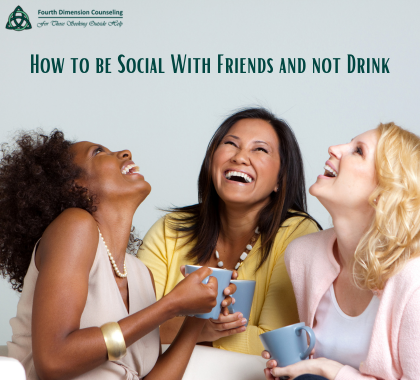 Socializing with friends is an essential part of maintaining healthy relationships and enjoying fulfilling experiences. However, it’s not uncommon for social gatherings to revolve around alcohol consumption. If you choose not to drink or prefer to minimize your alcohol intake, it’s important to know that there are numerous ways to engage socially while still having a great time.
Socializing with friends is an essential part of maintaining healthy relationships and enjoying fulfilling experiences. However, it’s not uncommon for social gatherings to revolve around alcohol consumption. If you choose not to drink or prefer to minimize your alcohol intake, it’s important to know that there are numerous ways to engage socially while still having a great time.
Ways to Be Social Without Drinking
-
Communicate Your Preferences:
Openly communicate your decision not to drink or limit alcohol consumption with your friends. Let them know that you enjoy their company and value socializing, but alcohol doesn’t align with your personal choices or goals. By sharing your intentions, you give them the opportunity to understand and respect your decision.
-
Choose Alcohol-Free Gatherings:
Seek out and suggest activities and events that don’t revolve around alcohol. Look for alternatives like movie nights, game nights, picnics, outdoor activities, or cultural events that provide opportunities for meaningful interactions without the focus on drinking. By actively proposing such activities, you can influence the social dynamic and create a more inclusive environment.
-
Plan Social Outings:
Take the initiative to plan social outings that cater to everyone’s preferences. Organize outings to coffee shops, tea houses, or non-alcoholic bars where the emphasis is on conversations and shared experiences rather than alcohol. This allows you to create a social environment that aligns with your values and provides enjoyable alternatives to traditional drinking settings.
-
Engage in Hobbies and Shared Interests:
Explore activities and hobbies that align with your interests and offer opportunities for social engagement. Join clubs, groups, or classes centered around shared hobbies such as sports, art, music, or volunteering. This allows you to connect with like-minded individuals who share your passions, creating social connections based on common interests rather than alcohol consumption.
-
Be a Designated Driver:
Offer to be the designated driver for outings or events that involve alcohol. Being the responsible driver not only ensures the safety of your friends but also allows you to actively participate in the social gathering without consuming alcohol. This role allows you to contribute to the group dynamic while fostering a positive and supportive atmosphere.
-
Cultivate Meaningful Conversations:
Focus on building deeper connections with your friends by engaging in meaningful conversations. Take an active interest in their lives, ask open-ended questions, and actively listen to their responses. By fostering genuine and authentic connections, you create a rich social experience that transcends the need for alcohol.
-
Practice Assertiveness and Boundaries:
In social situations where alcohol is present, it’s important to assert your boundaries confidently. Politely decline offers for drinks, and if necessary, explain your choice without feeling the need to justify or defend it. Remember that it is your decision, and you have the right to enjoy social interactions without compromising your values or preferences.
Being social with friends without relying on alcohol is entirely possible and can lead to rewarding and fulfilling experiences. By openly communicating your choices, seeking out alcohol-free activities, engaging in shared interests, and cultivating meaningful connections, you can create a social environment that aligns with your values and preferences. Embrace the opportunities to connect, have fun, and make lasting memories without the need for alcohol, and enjoy the richness of social interactions on your terms.
More Advice:
- Do I Need to See a Counselor for Love Addiction?
- Simple Ways to Reduce Stress
- Sex Victims Can Experience PTSD
- Emotions and How to Process Them
- Sex Addiction Counseling
- How Do I Know it’s Time to Get professional Counseling?
- How to Heal from Betrayal Trauma
- What is PTSD? – (Government Help)
- The Mental Health Effects of Sexual Abuse
- The 4 Types of Intimacy
- 5 Ways to Reduce Stress
- What is Co-Dependency?
- How Same-Sex Couples Counseling is Different
- How to Know it’s Time to Get Mental Help
- How to Find a Great Relationship Counselor
- What if I Can’t Get in to See a Counselor?
